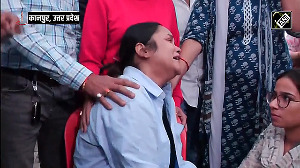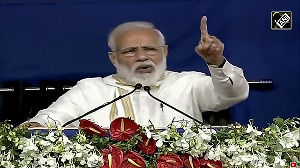On Christmas Day, 1990, Tim Berners-Lee decided to make the world a gift. So the father of the WorldWideWeb made his idea freely available, with no patent and no royalties due. His gesture has changed the way we communicate, and also the way we give.
Rules of the Game. Before you write out that cheque or give out your credit card details online, check the credibility of the nonprofit organisation you have chosen. Learn as much as you can about its programmes and the percentage of money raised that actually reaches the target-user.
If your money is going into the corpus, ask to see the organisation's financials. If it stashes away more than 30 per cent of its annual income, let's say it's being charitable only to itself.
In the process, be wary of schizo Web pages in Cyberia. In the week following Hurricane Katrina, over 2,500 storm-related domains were registered and 500 of those included the word 'Katrina'. Many are legit, others aren't. Phony charities are on the rise and cyber looting is rampant.
If you plan to take a tax deduction, confirm that the group is a qualified nonprofit organisation and has a valid 80G registration number. Most charities will be able to give you a receipt with a valid registration number, which entitles you to deduct 50 per cent of your donation from your taxable income. Some charities offer 100 per cent deduction. This means that you can afford to donate one-third more with the same net outgo from your pocket.
Mathew Cherian, chief executive, HelpAge, notes that his NGO's website emphasises on currencies "since people donate online from various parts of the world". However, Cherian points out, "We can only give tax exemptions based on Indian laws, and need to be registered elsewhere for tax relief to people who reside outside India...We can only furnish receipts." Charities Aid Foundation, on the other hand, can give offshore exemptions too as it has multiple registrations across multiple locations.
Ingrid Srinath, CEO, CRY India, spells out the most downloaded item on her website as the organisation's Annual Report. Check the fundamentals just like picking up that cherry off the bourse, and look for value, not junk. Srinath says that CRY India deducts 1.6 per cent of the amount donated online, before channelling the money to the end-user. "We have to pay VISA, Mastercard and other card service providers." That's where e-commerce starts wooing e-philanthropy.
Also, ensure proper security authentication of the website. For example, CRY India's website is certified by VeriSign. Venkat Krishnan N, director of online charity GiveIndia, observes, "While making online donations, cover issues like security, privacy and identity protection (use 128-bit encryption to ensure that the recipient is not able to capture your card details) become important. You can confirm the organisation's existence through human contact, either by email or phone call as this avoids phishing and indicates genuineness."
GiveIndia coordinates with partner NGOs to provide the donor a detailed feedback on how his money is used for the sake of transparency.
Beware of mushrooming fundraising agencies, which often charge a hefty fee of 50-70 per cent, leaving a pittance for the charity. If you are approached by a professional fundraiser, ask if he or she is an employee of a charitable organisation. If not, take a written statement regarding the percentage of money that the charity will receive. "Thirty per cent fundraising overheads is reasonable," claims Venkat.
To sum up, a good board, financial disclosures in the Annual Report, a fixed address/phone number, an invitation to visit them whenever you like and proper security certification from credible agencies are all signs of trustworthiness.
Honoris Causa. A look at how online donations are faring in India could give some critical insights. "Online giving is actually the easiest and fastest way to donate either through credit card, cheque or electronic clearing service," says Willeke van Rijn, consultant, Oxfam Trust. ECS is a series of electronic payment instructions.
A single debit transaction triggers many credit entries. These credits, or electronic payment instructions, which have details of the beneficiary's account number, amount and bank branch, are then communicated to the bank for crediting the accounts of the beneficiaries either through magnetic media duly encrypted or through hard copy.
Online donations also free non-profit bodies from overheads like direct mailers, couriers and printing costs. Globally, the Oxfam Trust website fetches 2.5-3 per cent of the total revenue for Oxfam Trust. "And that's healthy considering Oxfam has gone online recently," seconds Willeke.
Explains Srinath, "The cost of sending out direct mailers can be prohibitively high at Rs 10 per mail. Online communication can be achieved under one per cent of that." Last year, CRY India mopped up Rs 80 lakh (Rs 8 million) through online charity out of Rs 40 crore (Rs 400 million) overall donations from the country. At just five per cent, its not impressive, but with surging PC penetration, online growth rate cannot be ignored.
In 2005-06, of the Rs 17 crore (Rs 170 million) that HelpAge received as donations, Rs 20 lakh (Rs 200 million) came online. Cherian contends that the real spurt in online giving "will depend on the younger generation and the march of IT infrastructure in the country."
On the HelpAge website, nearly 80 per cent of the donors prefer to pay via credit card, a sharp contrast from yesteryears, thus reflecting the philanthropic traits of a much younger crowd who are ready to spend for their cause online.
When Tim Berners-Lee received the 'Freedom of the Information Technologists' award in London this year, he commented: "I feel honoured to be given an award by a company whose members do so much to bring the benefits of technology into the lives of the disadvantaged."
In a domain where the term 'R.I.P.' has assumed a completely different meaning, you can't help but rip that quote to your archive. So, the next time you give online, just read the fine print and breathe easy.
|
Key Players in Online Donation in India | |||
| NGO | Website | Net Practice |
Overheads charged online |
| GiveIndia | www.giveindia.org | Raises roughly Rs 2 crore every year through the Internet. Has over 100 certified charities | 1% |
| CRY India | www.cry.org | Promotes child rights. Raises Rs 80 lakh a year, online | 1.6% |
| HelpAge | www.helpageindia.org | Looks after the needs of the aged. Received Rs 20 lakh online last fiscal | 2% |






 © 2025
© 2025